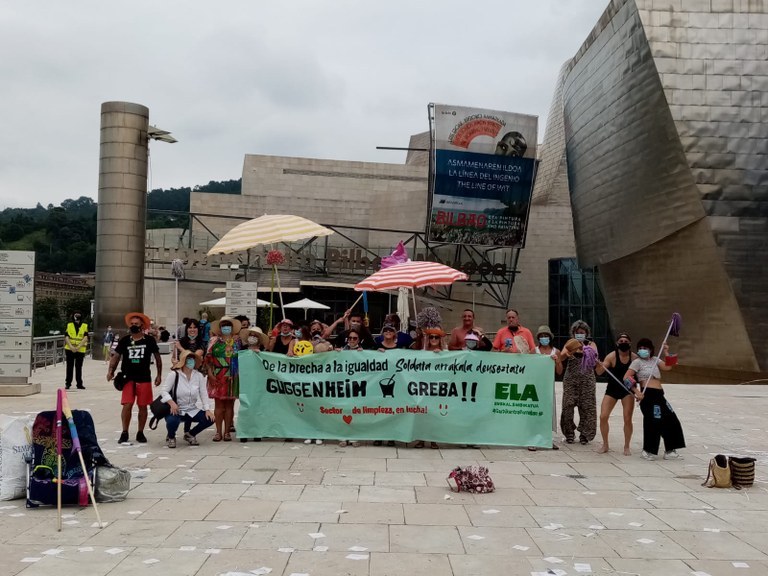The Guggenheim Museum: Inequality is cheap and tempting

While the cleaning service in the Bilbao Guggenheim Museum continues its strike, backed by ELA, several news items have been revealed that clearly show the weaknesses and inequalities in the museum.
On the one hand, the General Deputy for Biscay, Unai Rementaria, affirmed that the new extension of the Guggenheim in Urdaibai will be built “no matter what”, and that to do this, the Regional Council would be willing to provide the necessary economic contribution if the European Funds were not to be received. Megalomania apart, it is worth reminding Unai Rementaria that the taxpayers should be the ones who decide on such a contribution, that is to say, the working class that has seen how Biscay, along with the rest of Euskal Herria’s industrial policy and tissue, have been agonising in recent years, while a tourism model sustained by insecure jobs, without any guarantees is being promoted.
On the other hand, the Museum’s management has advertised a grandiose crowd funding campaign to renew the internal structure of Puppy. In spite of the fact that it had been presented as an adorable, modern initiative, we should ask ourselves what type of museum model we are upholding, in what conditions and at the expense of what and who.
And the fact is that a museum is not only held up by steel and titanium structures, with megalomaniac projects and donation campaigns. The museum is upheld by its workers. And the management of the Bilbao Guggenheim, along with the Basque Government and the Bilbao City Council and the Biscay Regional Council, who are all members of the Trust and Executive Board (with the Basque president/Lehendakari presiding over the Trust and the General Deputy presiding over the executive board), have been neglecting and mistreating these foundations for many years, particularly by using outsourcing. And obviously, as is happening with the Puppy, it is all beginning to fall down.
The Guggenheim’s cleaning service is an example of this. A feminised group who, after 20 years giving their service, on the 11th of June started a strike to claim decent wages and working conditions that rectify the wage gap and take them out of the poverty to which the outsourcing system and a completely obsolete collective bargaining agreement condemns them to (it is not the only group at the Guggenheim that has come into conflict in recent years).
All the institutions, including those participating in the Museum’s Trust are happy to mouth off with messages in favour of equality: we hear them and read them every 8th of March. However, when the chips are down, when they realise that equality requires (amongst other things) public investment, the obstacles all start to appear; and this is also the case of the Guggenheim. The wage gap exists because it is good for them: it is very economic for the museum. The system needs there to be sectors covered by women, where they can pay very low wages merely due to the fact that work by women has a lower consideration and valuation. It is not that equality is expensive; it is really that inequality is very cheap and tempting.
This is shown by the data. If we compare two subsectors within cleaning, one with male workers (street cleaning) and another with female workers (office cleaning), taking only the base salaries for each subsector as a reference (that is to say, without taking the bonuses into account), the work in the women’s sector is paid 8,000€ less per year (the base annual salary for a cleaner in Biscay is around 16,000€, if the worker is “lucky” enough to work fulltime.) Effectively, as scandalous as it seems, the wage gap in cleaning in Biscay is approximately 50%. And the situation of the workers at the Guggenheim is not much better with part-time work, wages that do not reach 900 euros per month and with unsustainable workloads.
After over 20 days on strike, on the other hand, the Museum’s management has yet to provide any solutions and continues to deny any salary difference. Without any doubt, a conscious, wilful decision to perpetuate the wage gap, inequality and poverty. An attitude that contrasts with Rementeria’s determination to provide whatever is “necessary” for the construction of the Guggenheim or the words by the Museum’s director, Juan Ignacio Vidarte, urging that amongst us all, the installation by Jeff Koons, Puppy can be renewed.
Is the general public really demanding millions of euros to be used for an extension of the Guggenheim in Urdaibai, while the museum’s cleaners are on strike because they cannot last to the end of the month? Is this investment really in the interests of the working class? The Bilbao City Council and the Regional Council would do well to resolve all the poverty and inequality that is hidden behind the Guggenheim before starting up monumental projects with money that should be used for the workforce. The last thing people need is to extend a tourism model that causes job insecurity and inequality.
